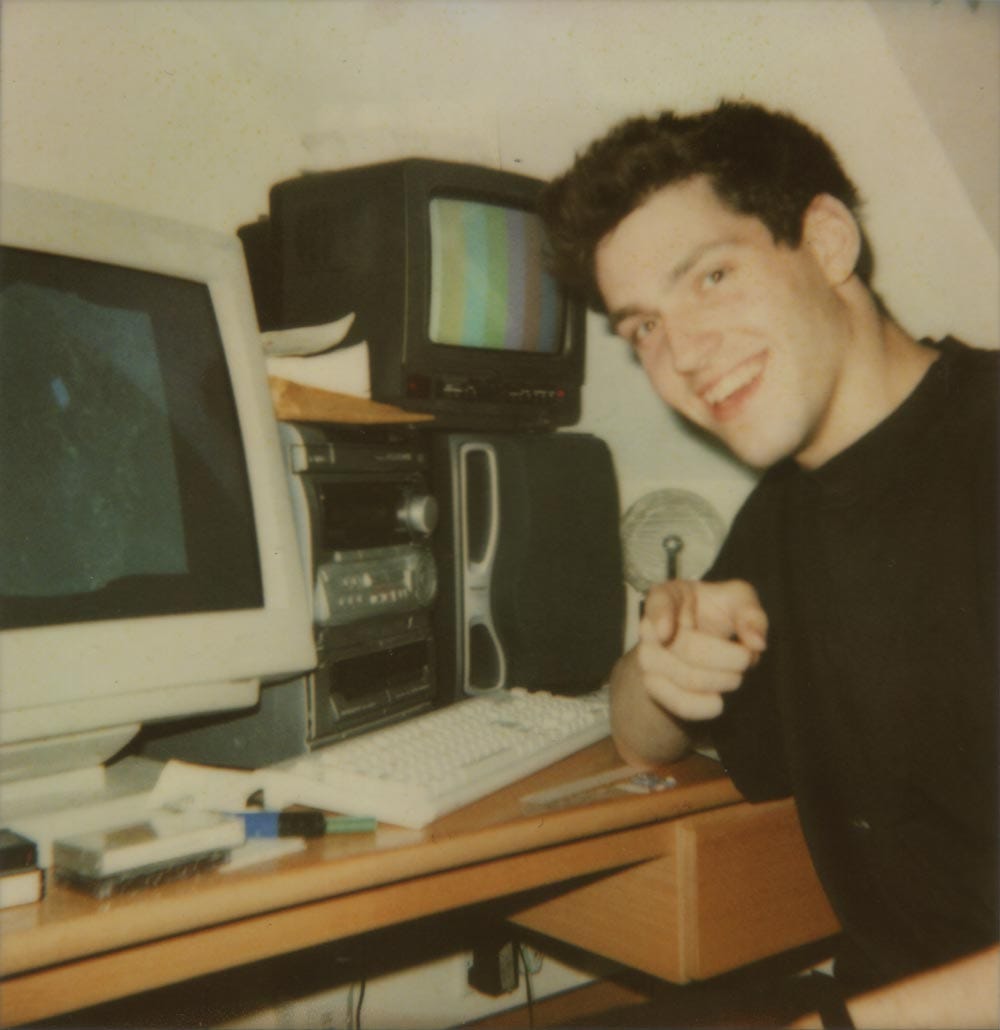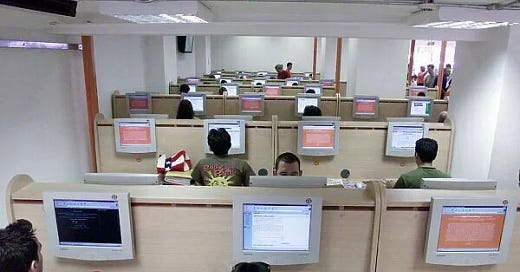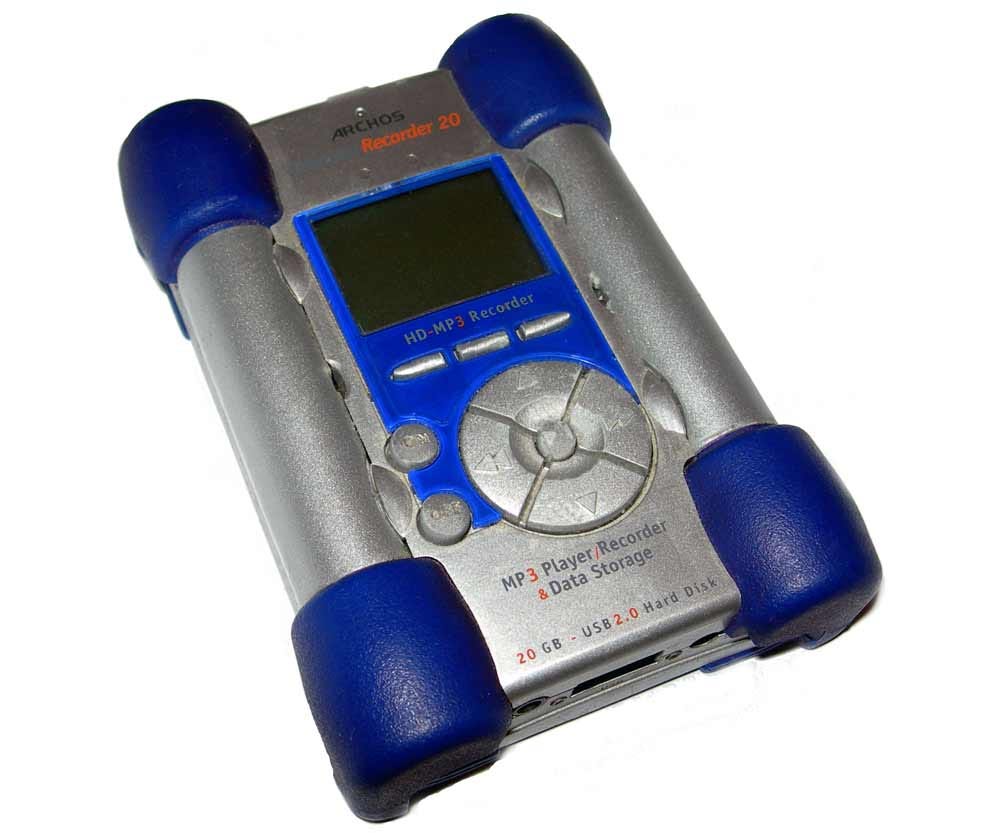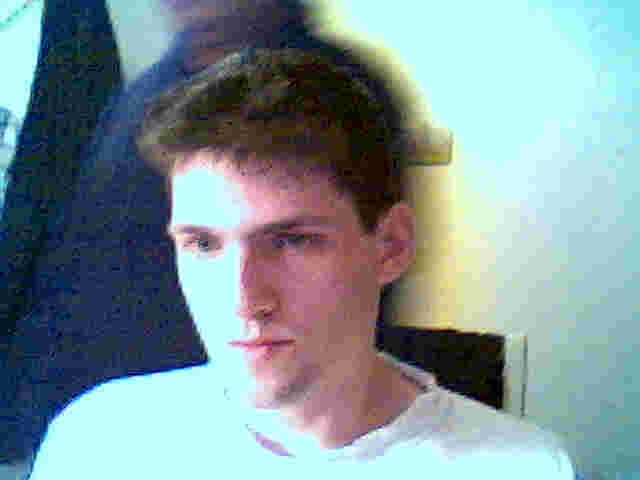One evening in late 2001, I was in an Internet cafe in Edinburgh. It was the easyInternet cafe on Rose Street, and it was raining outside. There were dozens of other people in the room with me, each looking at a flatscreen that was fixed to a cheap MDF wall. The keyboard and mouse were not wireless, and their wires disappeared into that wall, which also had a USB socket for connecting optional devices - though in 2001 the options were probably limited to a potato webcam, a 32mb pendrive, a terrible digital camera or the earliest of mp3 players.
WhatsApp and Telegram didn’t exist back then. Even Skype was still two years away. But there were other, more clunky ways to do realtime text chat. In honesty I can’t actually remember what those were, but we must have had them, because I can remember being in there on that evening and wanting to have a text chat with a friend who was far away. It was a regular thing. We did it a lot, because I was in love with her.
The problem each time was that, of course, she usually wasn’t at her computer. I needed some way to alert her. I could send her an SMS text message from my mobile, of course, but that would cost money. Luckily, I found a trick. A website called Vizzavi enabled you (for some reason) to send text messages for free. I did that. My friend received the message on her phone. She went to her computer. We then had a realtime text chat - from an Internet cafe, me reading her words on a flatscreen monitor.
I remember realising at the time… “Every aspect of this would have been impossible just 18 months ago.”
And indeed, 18 months earlier, I hadn’t even had a mobile phone. As for Vizzavi, that website was less than a year old. The easyInternet cafe on Rose Street, likewise. And that flatscreen monitor was the first one I had ever used. It really was a new world. Technological change was a real thing, and seemed to be happening much faster than before. You could actually perceive it playing out.
Vizzavi was gone within a year, but I found some other service that did the same thing.
At the very start of 2002, I moved from Edinburgh down to London. A big new metropolis, on my own, and I was only 19.
I continued using Internet cafes there. Early on, I briefly experimented with exploring the city, getting out at random stations on the tube and just wandering around. On one occasion this resulted in me finding myself in the middle of nowhere on a very windy evening. To this day, I have no idea where it was. I had been walking for ages, while the sky got darker and the weather got worse. Derelict buildings and semi-demolished waste-grounds, such as you simply don’t see in London nowadays, were all around me. Suddenly in front of me was a light. Getting closer, I realised it was an Internet cafe. What a relief! Inside, it was small and cramped and there were no other “customers”. I was delighted to get away from the weather into somewhere warm, calm and comfortable. Then I realised that you were actually allowed to smoke in there! By this time, smoking was becoming frowned upon. You could still do it in every pub and every restaurant, but “modern places”, like vegan restaurants and Starbucks and Internet cafes, were always non-smoking. This place, somewhere in London that I will never remember, was an exception. And I was only there once. It was a unique experience in my life, a convergence of two eras - the smoking past, the Internet future - that could overlap only very briefly. But it was a lovely evening, there on my own, surfing happily, with a Coke from the vending machine and a cigarette in my hand, while the wind blew outside.
Within a few weeks I found a very convenient Internet cafe, on the King’s Road, close to my art college. It was another easyInternet outlet, and I remember being dismayed that my pass for the Edinburgh one wasn’t valid here, so I couldn’t use my remaining credits and instead had to buy a new pass.
A few months after moving to London, I got my first mp3 player - an Archos 20gb Recorder. It actually contained an old-fashioned magnetic hard drive, so it was heavy and big, though it could fit in a large coat pocket. The interface screen was monochrome like the original Gameboy. When you switched the device on, the magnetic hard drive would whirr into action - something you could both hear and physically feel.
I digitised many of my CDs, initially at the default quality of 128kbps, blissfully unaware that those files would one day sound tinny and cheap. I didn’t even notice at the time that they were audibly inferior to the CDs I had owned and loved for many years. I only noticed the incredible convenience. And indeed, it was really something to be carrying around a hundred albums wherever you went.
By the end of that decade, the Internet cafes were gone, and so was SMS text messaging, and so even were mp3 players and a whole range of other devices - and all because of the arrival of the smartphone.

Of course it is silly to lament the passing of these things. They always had a very short life expectancy due to the relentless march of technology and the narrowness of their respective functions. It was inevitable they would be superseded, and soon.
But there was something to be said for the limitations. Before mp3, the absence of it meant that you got to enjoy the experience of going to record shops, finding the thing you wanted or even an album you didn’t know you wanted, holding a physical thing in your hands and buying it and reading the inlay booklet, and taking it around to a friend’s house. If you didn’t have the physical object, you couldn’t hear the music; this was limiting and sometimes annoying when an appetite could not be immediately sated, but on the other hand, it really did make you appreciate the music more.
Similarly, the absence of Internet “on the move” meant that you got to enjoy the experience of going to a specific place (an Internet cafe) in order to get online, and there in that place you could relax, have a drink, even possibly a smoke. It also meant, of course, that outside of those places you were free of the Internet - and that was both good and bad.
But more than any of that, I miss living in a time that seemed simpler, and much more optimistic, than today. To say the world seems darker now than in the early 2000s would hardly cover it.
In those very first years of the new millennium, we were yet to realise that we had entered an era in which, yes, technology would rapidly advance, but that would be the only change. Throughout the decade, nothing else happened. Culture, music, film, fashion, decor… all of these had frozen in the year 2000. The decade would end up being a genericised, sterilised version of the 1990s; it would be the 1990s but with all the subcultures and experiments removed. In retrospect, the 2000s existed to construct the smartphone, everything else being on hold until that was achieved. Culturally, the decade was a stop-gap - empty, hollow and bland.
But in 2001, the cultural freeze had yet to become apparent. It was possible - indeed, natural - to assume ongoing novelty and innovation like before, and the social conditions that allow for those. Speaking of which, we also enjoyed the belief that cultural and social change are spontaneous and “grass-roots” - another pleasant notion that now seems tragically naive.
I also miss the specific optimism about technology. Then, each new thing seemed liberating and enabling. Now, one actually dreads to learn of the next new thing - what it will do, which behaviours it will promote, which hideous conceptions of humanity underpin it, and how much more surveillance and control it will enable.
We are truly living in a dystopia now, and of course one can say (truthfully) that we were on the straight road towards it in 2001 and even long before that. But still, a simpler time, in which one was freer, is difficult not to miss.








Very compelling piece. Absolutely agree about dreading the next tech advance, that's exactly how I feel too.
I must say I completely missed out on the whole "Internet cafe" thing. Technology fandoms & online activity in general used to have a more real life social aspect even back in 2007 era Internet just before the smartphone invasion. It's something no one really writes about: the social structures built on previous versions of the Internet are as fleeting as the technology. Honestly the way tech changed & especially enforcement of policies has already warped & changed our sphere immensely just in the last 4 years.